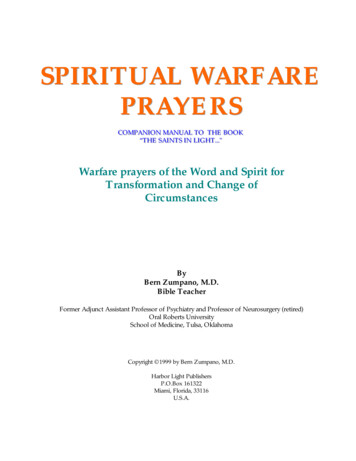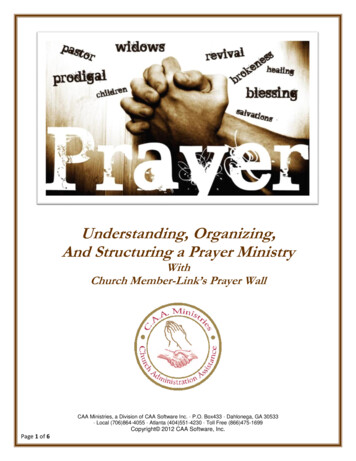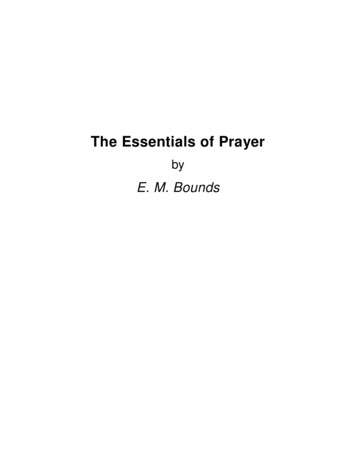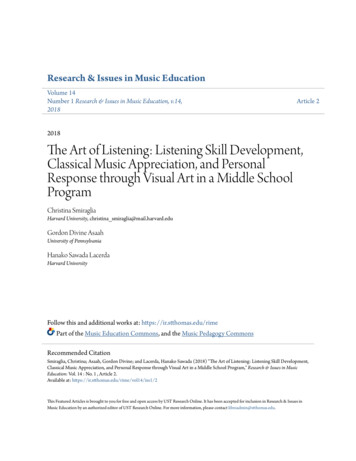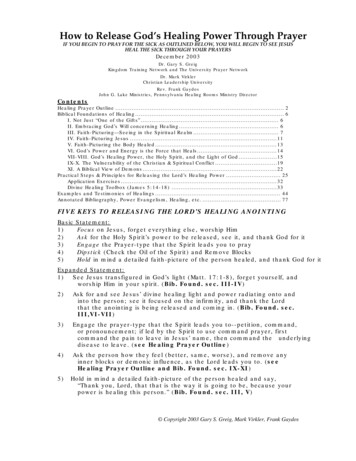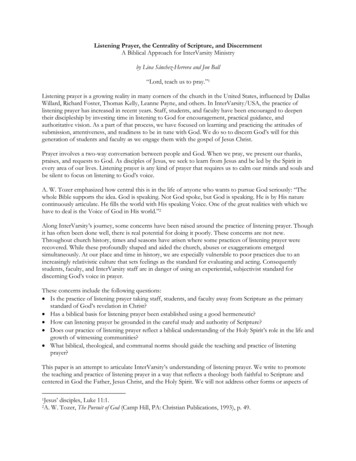
Transcription
Listening Prayer, the Centrality of Scripture, and DiscernmentA Biblical Approach for InterVarsity Ministryby Lina Sánchez-Herrera and Jon Ball“Lord, teach us to pray.”1Listening prayer is a growing reality in many corners of the church in the United States, influenced by DallasWillard, Richard Foster, Thomas Kelly, Leanne Payne, and others. In InterVarsity/USA, the practice oflistening prayer has increased in recent years. Staff, students, and faculty have been encouraged to deepentheir discipleship by investing time in listening to God for encouragement, practical guidance, andauthoritative vision. As a part of that process, we have focused on learning and practicing the attitudes ofsubmission, attentiveness, and readiness to be in tune with God. We do so to discern God’s will for thisgeneration of students and faculty as we engage them with the gospel of Jesus Christ.Prayer involves a two-way conversation between people and God. When we pray, we present our thanks,praises, and requests to God. As disciples of Jesus, we seek to learn from Jesus and be led by the Spirit inevery area of our lives. Listening prayer is any kind of prayer that requires us to calm our minds and souls andbe silent to focus on listening to God’s voice.A. W. Tozer emphasized how central this is in the life of anyone who wants to pursue God seriously: “Thewhole Bible supports the idea. God is speaking. Not God spoke, but God is speaking. He is by His naturecontinuously articulate. He fills the world with His speaking Voice. One of the great realities with which wehave to deal is the Voice of God in His world.”2Along InterVarsity’s journey, some concerns have been raised around the practice of listening prayer. Thoughit has often been done well, there is real potential for doing it poorly. These concerns are not new.Throughout church history, times and seasons have arisen where some practices of listening prayer wererecovered. While these profoundly shaped and aided the church, abuses or exaggerations emergedsimultaneously. At our place and time in history, we are especially vulnerable to poor practices due to anincreasingly relativistic culture that sets feelings as the standard for evaluating and acting. Consequentlystudents, faculty, and InterVarsity staff are in danger of using an experiential, subjectivist standard fordiscerning God’s voice in prayer.These concerns include the following questions: Is the practice of listening prayer taking staff, students, and faculty away from Scripture as the primarystandard of God’s revelation in Christ? Has a biblical basis for listening prayer been established using a good hermeneutic? How can listening prayer be grounded in the careful study and authority of Scripture? Does our practice of listening prayer reflect a biblical understanding of the Holy Spirit’s role in the life andgrowth of witnessing communities? What biblical, theological, and communal norms should guide the teaching and practice of listeningprayer?This paper is an attempt to articulate InterVarsity’s understanding of listening prayer. We write to promotethe teaching and practice of listening prayer in a way that reflects a theology both faithful to Scripture andcentered in God the Father, Jesus Christ, and the Holy Spirit. We will not address other forms or aspects of1Jesus’2A.disciples, Luke 11:1.W. Tozer, The Pursuit of God (Camp Hill, PA: Christian Publications, 1993), p. 49.
Listening Prayer—2prayer, such as contemplative prayer or centering prayer, but will focus on the kind of prayer that has the aimof hearing from God.A Biblical Framework for the Practice of Listening PrayerMany of us have seen the negative and sometimes tragic results when people are convinced they havereceived a message from God but have not submitted that to a wise process of discernment. Yet theScriptures and saints down through the centuries bear witness to the fact that the God of the Bible is a Godwho speaks to people. Dallas Willard wrote, “Hearing God? A daring idea, some would say—presumptuousand even dangerous. But what if we were made for it? What if the human system simply will not functionproperly without it? There are good reasons to think it will not . Is it not, in fact, more presumptuous anddangerous to undertake human existence without hearing God?”3How can we cultivate a conversational relationship with God in ourselves and in others in a way that seriouslyaddresses the inherent dangers and presumptions?Learning from Jesus to Listen to GodAs staff, students, and faculty who follow Jesus as Lord and Savior, we do well to begin by looking to Jesus.Luke’s Gospel gives us a good starting point, because his desire is to show us the nature of Jesus’ life andmission. Luke highlights patterns in Jesus’ life that point us to biblical discipleship. We will start with hisdepiction of Jesus hearing God’s voice in Luke 3 and 4.Identity, Belovedness, and Mission“Now when all the people were baptized, Jesus was also baptized, and while He was praying, heaven was opened, 22 and theHoly Spirit descended upon Him in bodily form like a dove, and a voice came out of heaven, “You are My beloved Son, in You Iam well-pleased.’” (Luke 3:21-22 NASB)⁴Jesus certainly knew the scriptures that describe God as a God who abounds in love (Exodus 34:6), whoknows us and cares for us deeply (Psalm 23 and 139). Yet evidently God wanted Jesus to start his ministrywith a profound experience of the Father’s love for and delight in him. Jesus heard God’s voice directly,addressed personally to him. If the Son of God needed this kind of encouragement, how much more do we,his disciples, in all our brokenness and insecurity, need a sense of personal and intimate relationship withGod, our loving Father? God our Creator takes pleasure in us and gives us his Holy Spirit to empower us andto accomplish his purposes for us.Following Jesus’ example in Luke, the main purpose of listening prayer is to be aware of God’s presence andopen to God’s agenda. God takes pleasure in our presence. As we accept his invitation to be with him, theSpirit helps us become aware of the presence of God among us, and helps us say “Abba, Father!” Notice,too, that Luke says that “Jesus was praying” when he had this experience. Cultivate a pattern of life that weaves in significant space and time for prayer.Spirit-Led, into the Wilderness“Jesus, full of the Holy Spirit, returned from the Jordan and was led by the Spirit in the desert, where for forty days he wastempted by the devil. He ate nothing during those days, and at the end of them he was hungry.” (Luke 4:1-2)3DallasWillard, Hearing God: Developing a Conversational Relationship with God (Downers Grove, IL: InterVarsity Press, 1999), p. 9.⁴All verses are in NASB unless otherwise noted.
Listening Prayer—3Luke makes two remarks here on the relationship between Jesus and the Holy Spirit. First, we cannot escapethe fact that Jesus experiences the directional leadership of the Holy Spirit. One good test of listening prayeris whether it leads us where we would not naturally go. Ironically, we may dismiss a sense of directionprecisely because it doesn’t feel good or sound reasonable. Second, Jesus had heard the voice of the Fatherand had been filled with the Spirit, yet his preparation to launch his mission was not complete. The Spirit ledhim into a desert. Submission—the willingness to follow God’s guidance—is a prerequisite to hearing God’svoice. Practice solitude, silence, fasting, and withdrawal from productivity.The Written Word of God“The devil said to him, ‘If you are the Son of God, command this stone to become a loaf of bread.’ Jesus answered him, ‘It iswritten, “One does not live by bread alone.”’” (Luke 4:3-4)Luke describes the devil confronting Jesus with three challenges; each time, Jesus answers with a quote fromDeuteronomy (Luke 4:1-13). Paul Byer has suggested that Jesus was meditating on the book of Deuteronomyduring his fast. Jesus had memorized the written Word of God to strengthen his soul and mind, and used it toresist temptation until the devil fled. The Bible is the measuring stick against which we can measure truth andfalsehood, good and evil, God’s voice and other voices.We are bombarded by the voices of the devil, the spirit of this age, and the desires of the flesh (Ephesians2:1-3). It is often hard to distinguish God’s voice from these. As Jesus himself demonstrates, the Scripturesgive us the clearest way to identify God’s voice amidst the cacophony. A central conviction of sound theologyis that the Spirit will not speak a word that contradicts the clear revelation of God’s character and purposes inthe Bible. If we hope to truly discern God’s voice, we must: be devoted to consistent study of the Scriptures in their entiretyunderstand the broad doctrines and truths of a truly biblical theologyWays God SpeaksLuke tells us Jesus returned to Galilee in the power of the Spirit and was teaching in the synagogue. On onesabbath in Nazareth, he was handed the scroll of Isaiah:He opened the book and found the place where it was written,“The Spirit of the Lord is upon Me,Because He anointed Me to preach the gospel to the poor.He has sent Me to proclaim release to the captives,And recovery of sight to the blind,To set free those who are oppressed,To proclaim the favorable year of the Lord.”And He closed the book, gave it back to the attendant and sat down; and the eyes of all in the synagogue were fixed onHim. And He began to say to them, “Today this Scripture has been fulfilled in your hearing.” (Luke 4:18-21)Jesus’ reading from Isaiah 61:1-2 was significant as he applied words from the Old Testament specifically tohis time and context.In these chapters, we see Jesus moving back and forth from specific words from God to God’s general word.The voice from heaven was a specific word, given personally to Jesus at a specific place and time. In thewilderness, Jesus meditated on and spoke the Scriptures, the written Word of God, with God’s general truth
Listening Prayer—4to counteract temptation. Then, in Nazareth, he reads from the written Word and applies it specifically to histime and context.God’s voice may come to us as individuals, but more often it comes to us as a community. The Bible revealsthat God is infinitely powerful and infinitely creative. As Dallas Willard suggests in the above quote, it wouldbe presumptuous to limit the Lord to a narrow set of modes for communicating with us. Seek to hear God in three ways:o general truth through the revelation of Scriptureo specific applications of the Scriptures to our particular time and contexto direct, personal communicationBiblical Examples of God’s CommunicationGod speaks in the Scriptures in many ways, including through:1. a particular scripture coming to mind (Acts 1:20; Acts 13:16ff)2. a picture or vision (Acts 10:11-17; Acts 16:9-10)3. a dream (Daniel 4:4-17; Daniel 7:1-14)4. an interpretation of a dream or vision (Daniel 4:18-27; Daniel 7:15-27)5. a picture or impression of a word (Acts 10:3ff )6. a sensation or pain in one’s body (Acts 9:8-9)7. a spiritual song (Acts 16:25; Ephesians 5:19)8. divinely sent messengers or angels (Acts 1:9-11; Acts 8:26) (Philip is told to go south to Gaza—that’sall—but along the way he bumps into a seeker, and it’s obvious to Philip this is the reason he wastold to come.)9. signs and wonders (Luke 23:44-45; Acts 5:18-21; Acts 9:36-42; Acts 12:6-11)10. restriction of movement and speech (Acts 16:6-8)The clearest picture we have of God is Jesus who is the image of the invisible God and in whom the fullnessof the godhead dwells in bodily form (Colossians 1:15-20). Becoming students of Jesus—indeed, becoming asfamiliar with him as we can through the witness of the entire New Testament—will lay a solid foundation forgenuine discernment of the voice of God.We need to be careful in applying various texts to listening prayer. Many Scriptures have been used in asloppy way to teach or justify certain practices. For example, John 10:4 is often quoted: “My sheep know myvoice.” In the context of John 9–10, Jesus is contrasting those who believe in him and those who do notbelieve: the disciples have believed, and the Pharisees and religious rulers have not. So the text does not haveto do with hearing his voice or receiving a prophetic word from the Lord. Knowing Jesus’ voice in thiscontext has to do with belief, not receiving a prophetic word from the Lord.On the other hand, there are a number of passages where Scripture directly addresses this topic. Later inJohn, Jesus tells his disciples repeatedly that he will speak to them through the Holy Spirit (e.g., John 14:26).In 1 Corinthians 14 Paul clearly lays out guidelines for receiving and dealing with several kinds of words fromGod. One such instruction in 14:26-29 specifically tells the Corinthians to share words they believe are fromthe Lord, and to let others in the church weigh or discern what is said.1 Thessalonians 5:19-21 also directly addresses how to hear God and discern properly: “Do not quench theSpirit. Do not despise the words of prophets, but test everything; hold fast to what is good.” Paul exhorts theThessalonians about two opposite dangers. On one hand, quenching the Spirit closes us off to God. On theother, not testing everything opens us up to all kinds of dangers.
Listening Prayer—5Do Not Quench the SpiritWe need to grapple with the reality that we may have closed ourselves off from God, and we may never hearthe Lord speak to us because we are not expecting it or because we quench the Spirit. Jesus models for usopenness to hearing the Father’s voice, not only at his baptism but also throughout his ministry (John 5:19,30).Rather than quench the Spirit, we must develop ears to hear the many kinds of ways God may speak. Inaddition to the previous list, people have “heard” God through numerous means, including: words forming on their lips as they speak a concept or metaphor a memory of something that happened to them or someone elseGod often speaks in a still, small voice (1 Kings 19:12). If God wants to speak to us, the Holy Spirit is fullycapable of making the message clear to us. However, we need to take on a posture of humble asking andattentive listening. Jesus is gentle and meek of heart, and he will not force a message on us that we areunwilling to hear.Quiet receptivity opens us to the Spirit. Jesus only said and did what the Father did (John 5:30 and John 14:910). If Jesus needed to listen, then we do as well! And in fact, he promised his disciples,Those who love me will keep my word, and my Father will love them, and we will come to them and make our home withthem. Whoever does not love me does not keep my words; and the word that you hear is not mine, but is from the Fatherwho sent me. I have said these things to you while I am still with you. But the Advocate, the Holy Spirit, whom the Fatherwill send in my name, will teach you everything, and remind you of all that I have said to you. (John 14:23-26)Test EverythingHow do we test everything? We suggest using a filter. This drawing depictsa simple water filter into which you can pour muddy water. The water willtrickle through the various layers and, in the end, only crystal clear,drinkable water will remain.4Here is a simple four-step filter for discernment (see appendix).1. Scripture: God never speaks in conflict with his WordTwo possible simple rubrics to capture the counsel of Scripture in acondensed way:(a) The Lord’s Prayer as a discernment guideline: Does what I thinkI’m hearing glorify God’s name(b) Desires of the flesh vs. fruit of the Spirit: Does this word promotelove, joy, peace (Galatians 5:22-24)? Or does it promote the desires ofthe flesh—impurity, sexual sin, competition, envy, anger, idolatry,substance abuse, partying, and the like (Galatians 5:19-21)?2. Confirmation from the community of disciples, both local and historical (1 Corinthians 14:27-29)3. Consistent with character development4. Confirmation in events (Numbers 16:28)⁵Water filter image from s/2011/11/Filter1.jpg.
Listening Prayer—6All of this must be done with a posture of submission, humility, and faith in God. Be gentle, cautious, andsensitive. Give others present a chance to test a word and ponder it, and then be willing to hearmodifications, a negative response, or a different direction. Always maintain a posture of blessing others, asthis is always God’s posture toward us.Multiple confirmations increase our confidence level that what we sense may be from God. In the finalanalysis, we cannot know for sure if a word is from God. Following Jesus requires faith, and faith often feelsuncomfortable and risky. But our faith is in Jesus, our Good Shepherd, to lead us and to save us, not in ourown abilities to hear him or to make the right decisions. In Jesus we have freedom to fail.And finally, once we have carefully considered and discerned, we need to obey what we sense God telling usto do. If we fail to act or to take a step of faith in response to God, the word is useless (James 1:22ff; John7:17). The quickest path to spiritual deafness is hardening our hearts against a conviction we have from God.The opposite is also true: the path to hearing God more clearly is the path of the soft heart, shown to us bythe mother of our Lord, Mary, when the angel told her she would conceive and bear a son, though she wasstill a virgin. Her stunning response is a model for all of us who want to hear God: “Here am I, the servant ofthe Lord; let it be with me according to your word” (Luke 1:38).And of course, this posture was demonstrated most gloriously by our Lord Jesus himself when he knew hisFather was asking him to endure the agony of the cross. Matthew 26:39 records his words, which set thestandard for what it means to be fully human in relationship with God: “Father, if it is possible, let this cuppass from me; yet not what I want, but what you want.”Impact and Importance of Listening Prayer in InterVarsity/USAListening prayer has become more of a regular practice across InterVarsity, rooted in a deep desire to knowGod’s will in specific moments, so that we as a movement may join God in his purposes and work.Listening prayer has been used to seek God’s guidance in times of significant organizational change, such aswhen we were forming the national Strategic Plan, as well as for significant events, like the Urbana StudentMissions Conference, Regional Staff Conferences, and staff and student conferences for our StrategicMinistries. Staff and students have used listening prayer for discernment in personal and community decisionsand to help them grow in becoming more like Jesus during special seasons like sabbaticals and planting newministries.It is important to note that in all these contexts, Scripture has been featured as the primary way we havelistened to God in community. For example, the current Strategic Plan was formed through listening prayerafter times of deep Bible study or good exposition. Urbana programming is another example where this is thecase.Listening prayer has also been introduced to students on many campuses in different regions who gatherregularly to intercede for their schools. It has prepared and propelled many students to be witnesses of God’sgrace and love to their peers on campus.In addition, listening prayer has been practiced in the context of prayer teams during devotional times wherethe study of Scripture is the center of revelation and guidance, as well as the inspiration to worship the Lordand articulate our prayers. It has been a way to surrender what we are as a community and as individuals, tosurrender our expertise, and to lay down our own agendas in order to receive guidance from God about howto be faithful to the call to bring Jesus’ good news to the campus.
Listening Prayer—7In this wide variety of arenas in which listening prayer has been practiced, God’s guidance has been evident incommunal discernment of how to pray, plan, implement, and follow God’s will for InterVarsity’s mission oncampus and overseas.Recommended Listening Prayer PracticesWe offer these recommendations for staff to use in practicing and training students and faculty in listeningprayer in a way that is consistent with InterVarsity’s posture.1. Principles of Listening PrayerListening prayer should be practiced by, or done in community with, people who have been formed andtrained in handling the Word of God rightly. For this reason (among others) we should pay closeattention to the hermeneutical formation of students, faculty, and staff. People who do not have goodhermeneutics can misinterpret the Bible through Lectio Divina or other kinds of listening prayer.Inductive manuscript Bible study is one of the strongest ways to form individuals into the kind of peoplewho can safely do listening prayer and know when they are handling the Word of God rightly.Every practice of or training in listening prayer in InterVarsity will be based on: God’s love and eagerness to be in relationship with his people (Jeremiah 33:3) God’s desire to speak to the community of faith Jesus’ ongoing intercession for us before the Father the Holy Spirit’s work in God’s people—guiding, giving discernment, empowering, and building thecommunity of faith God’s revelation in Scripture, the study of which is the center of revelation and guidance Scripture’s teaching on prayer and meditation Scripture’s emphasis on the community of faith the promotion of the formation of Christlike character in individuals and communities the cultivation of fruitful mission on campusListening prayer is not: a technical way of relaxation; rather, it is a way to be fully present and available to God with allour senses a way to empty our mind and soul for our own good; rather, it is a way to submit our bodies,minds, and souls to God and to ask God to fill us with his Holy Spirit a way to use a simple word or phrase to center our attention on God; rather, it is a way to askGod to take away any worries, distractions, and voices that might keep us from hearing God’svoice a space for personal expression or opinions about what God is saying apart from Scripture, theHoly Spirit’s guidance, and the community’s discernment; rather, it is a prayer time to discernand hear God’s voice in community the only way to pay attention to God’s voice; rather, it is a way to receive guidance2. Purposes for Listening PrayerThrough the practice of listening prayer as individuals and as communities we: look for a space to be aware of God’s presence and guidance for his people become open to receive his love, consolation, correction, guidance, and empowerment quiet our souls and minds in order to be attentive to his teachings recognize that we depend on God as individuals and as communities with a mission
Listening Prayer—8 cultivate a learning and humble posture toward God’s Word and his purpose for InterVarsity’sministry recognize our need for the Spirit’s guidance, consolation, and empowerment to receive the Father’slove and do God’s will as Jesus’ disciples look for God’s name to be glorifiedNot coincidentally, these are the same reasons we study Scripture.3. When to Practice Listening PrayerListening prayer is an excellent practice to cultivate in many different arenas of ministry and life,including but not limited to: deepening our relationship with God setting a vision or confirming our vision even knowing what to pray about planning processes problem-solving situations pastoring students—both preparing for times with them, and while praying with them seeking God’s direction in writing talks and training materials looking for direction and discernment when making decisions looking for direction and discernment on prayer teams at InterVarsity conferences and meetings getting guidance and confirmation for personal and family situations seeking personal motivation, empowerment, and encouragement for mission seeking community motivation, empowerment, and encouragement for missionEvery aspect of InterVarsity’s ministry is focused on making lifelong disciples of Jesus. Robust, healthydiscipleship requires learning to listen to the Lord. But that alone is not sufficient; we must learn and teachothers to practice listening prayer in ways that are wise, biblical, and centered on Jesus and the Scriptures,guided by the Spirit, and in interdependence on our community. We must always cultivate an attitude ofhumility and readiness to respond in obedience to the voice of the Lord.
Listening Prayer—9Appendix: Possible Diagram for DiscernmentExperienceof God’svoiceAttitude ofhumility/submissionConsistent with ScriptureCommunity confirmation (local & historical)Consistent with character developmentDoes it come to pass?Confirmation as aword from the LordLeads to faith & mission
Listening Prayer—10Some Sources & ResourcesCarolyn Carney, “Guidance from the Holy Spirit.”Evan B. Howard, Praying the Scriptures (Downers Grove, IL: InterVarsity Press, 1999).Dave Ruark and InterVarsity staff at Michigan State University, eds., Corporate Prayer Handbook (June 22, 2006,version).Steve Stuckey, “Hearing God’s Voice: Lessons from a Beginner.”A. W. Tozer, The Pursuit of God (Camp Hill, PA: Christian Publications, 1993).Dallas Willard, Hearing God: Developing a Conversational Relationship with God (Downers Grove, IL: InterVarsityPress, 1999).
Listening prayer is a growing reality in many corners of the church in the United States, influenced by Dallas Willard, Richard Foster, Thomas Kelly, Leanne Payne, and others. In InterVarsity/USA, the practice of listening prayer has increased in recent years. St

